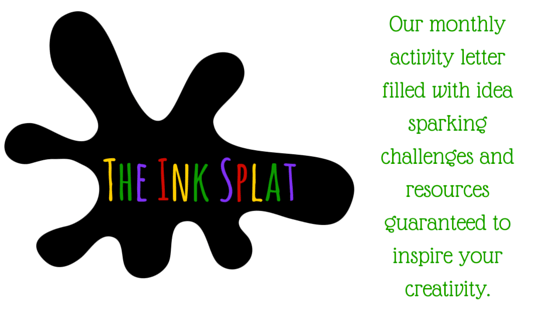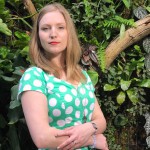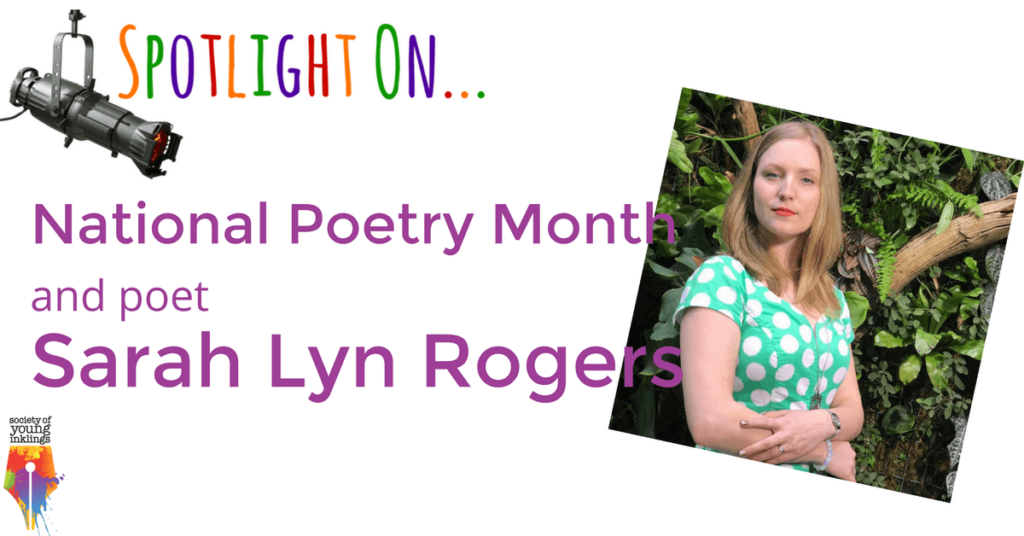
It’s National Poetry Month! This month, we’re interviewing Society of Young Inklings’ resident poet, Sarah Lyn Rogers. Sarah is our Editorial Director and also on our mentor team. Among other things, she is responsible for all the magic behind putting together our annual Inklings Book. For this month’s Ink Splat, we loved getting to talk to her about all things poetry.
Keep reading! As always, we’ve got a writing challenge for you, a fantastic interview, and some updates about Society of Young Inklings. Want to catch up? Check out last month’s Ink Splat here.
Writing Challenge
Open a book with your eyes closed and point to a word. That’s your first word. Do it again. That’s your second word. One more time and that’s your third word. Now, set a timer for ten minutes. Write as much as you can without stopping or looking. Mine what you like out of the rubble when you’re done.
Submit your responses by emailing submit@younginklings.org and you might be published on our website!
An Interview with poet Sarah Lyn Rogers
When did your interest in poetry start?
Dr. Seuss books were the first ones I learned how to read by myself. I didn’t think of his words as poetry until I was an adult, but they totally are. He’s so great with rhythm and sound play, all of those made-up words that feel exactly right. I also remember really digging Shel Silverstein in elementary school. When I was eleven, I played Puck in a Shakespeare play, A Midsummer Night’s Dream, and I had to learn all of these rhyming Old English lines in iambic pentameter, ten rhythmic beats like a thumping heart: baDUM baDUM baDUM baDUM baDUM. It wasn’t until I was a teenager with the internet at my disposal that I tried writing any poetry myself, in an anonymous community called AllPoetry, where I received feedback from kind strangers.
What do you love about the way poetry allows writers to express themselves?
Poetry feels like ultimate freedom to me. In fiction, you need characters, a setting, a goal, a problem, dialogue. All of the parts need to fit together in a believable way and progress in a particular arc: everything gets more and more dramatic until the problem gets solved or the main character fails spectacularly and learns something. There’s a lot of freedom in the details, but in fiction, a person needs to make something happen and learn something. Poems are more like a song, where there’s a mood and some kind of structure, and a twist or a bridge, but you can apply that vague format to anything. You can write about something as big as the universe or as small as a funny, mysterious sound, and you don’t even need to have a person in it. The words themselves are the characters, and they don’t need to do anything except make the reader go, “Huh. I never thought of that!”
Tell us about a poem of yours that you’re proud of.
I wrote a poem called “Rat Race” a few years ago. It’s a collection of images showing frustration, feeling limited, feeling caged. I’d had two separate lines in my head for weeks before writing it: “our housecat decimates a raspberry” (because my cat really does eat raspberries, sanding them down into nothing with her sandpaper tongue…how weird is that?) and “champagne-colored cars” (because I’d suddenly noticed this boring color on lots of cars in the neighborhood). There’s a website, 3elements Review, that gives you three words you must include in every poem you submit to them. Their prompt was “tandem bicycle, ache, procession.” I had these three words and my two mysterious lines, and somehow it all came together into a poem that captured a feeling I was having a hard time pinning down. Making one cohesive thing out of a bunch of mysterious images and feelings, and having it all feel right, is just the best.
Tell us about a poem by someone else that you love.
Matthew Zapruder is one of my favorite poets. His poems are really funny in an understated way. One of my favorites by him is called “Korea” and it includes these lines about fruit flies: “a tiny / weightless black / satellite orbiting / nothing above the sink” and “their dream to live / with their ten / thousand children / in a mango / or bagel that rolled / behind the refrigerator.” He notices such a tiny thing (a fruit fly) and compares it to something huge and metallic in space (a satellite). I love that it is orbiting nothing. It is impossible to orbit nothing. I love that he projects a family and a life story onto this fruit fly, which is kind of sad and beautiful, and then he makes it pathetic and hilarious that the fly’s dream is to live on a piece of food that rolled behind the refrigerator. Like the ritziest life would be to live on some rotting food in the dust and dark. I love writing that makes me frown-laugh.
What would you say to young poets reading this today?
Young poets, you are awesome. There’s a Pablo Picasso quote that I feel applies here: “Every child is an artist. The problem is how to remain an artist once he grows up.” Similarly, I think as we grow up we become embarrassed and unsure about poetry. Many adults seem worried about “getting it,” about decoding the secret meaning. Working with young poets in the Inklings Book Contest, I find that children always “get” poetry. There is no secret meaning. It’s the fun of Dr. Seuss’s wordplay, Shel Silverstein’s imagery, Emily Dickinson’s rhythms and long dashes, Zapruder’s tragicomic fruit flies. It’s throwing five unrelated things together to understand how they fit. It’s writing an impulse until it feels right. It’s engaging with something you don’t fully understand and loving it anyway.
Society of Young Inklings News

- Are you ready for more poetry? All month long, we’re hosting Facebook Lives about the craft of writing poetry. Catch up here and join us live on Facebook Tuesdays at 2:30 pm PT.
- Did you miss the Inklings Book Contest but are still longing for feedback? We’ve got you covered! Check out our Editorial Letter Mentorship. Send us your writing and one of our mentors will write you back with feedback and ideas to sharpen your skills.
- Bay Area Inklings, join us for our upcoming Launch Your Novel Workshop on May 5! You’ll come away with concrete steps and a flexible plan to take your novel from an idea to a reality.
- Join our society! We’ll send you a FREE Inklings Starter Kit with tips and tricks personalized to your creativity style.
A special thanks to Sarah Lyn Rogers!
 Sarah Lyn Rogers is a Pushcart-nominated writer, the former Fiction Editor of The Rumpus, and the Editorial Director for Society of Young Inklings. She is the author of Inevitable What (Sad Spell Press, 2016), a poetry chapbook on magic and rituals. A collaborative poem she wrote with Isobel O’Hare will appear this summer in the Black Lawrence Press anthology They Said: A Multi-Genre Anthology of Creative Writing. For more of her work, visit sarahlynrogers.com.
Sarah Lyn Rogers is a Pushcart-nominated writer, the former Fiction Editor of The Rumpus, and the Editorial Director for Society of Young Inklings. She is the author of Inevitable What (Sad Spell Press, 2016), a poetry chapbook on magic and rituals. A collaborative poem she wrote with Isobel O’Hare will appear this summer in the Black Lawrence Press anthology They Said: A Multi-Genre Anthology of Creative Writing. For more of her work, visit sarahlynrogers.com.
[pexcirclecta pex_attr_small_title=”Never miss an Ink Splat!” pex_attr_title=”Join to receive a personalized starter kit and our monthly Ink Splat in your inbox.” pex_attr_button_text=”Join Society of Young Inklings” pex_attr_button_link=”https://www.younginklings.org/home/welcome/” pex_attr_button_link_open=”new” pex_attr_button_color=””][/pexcirclecta]


